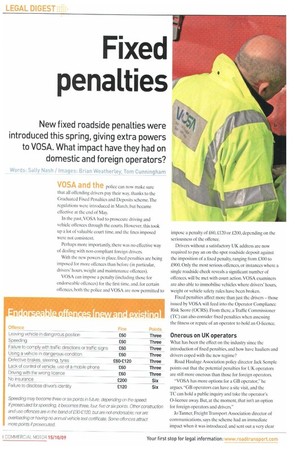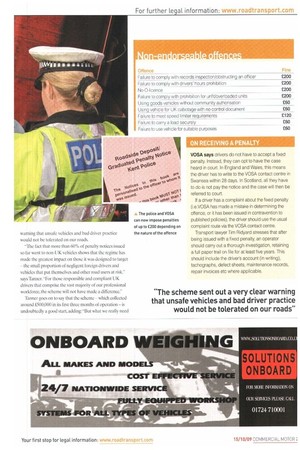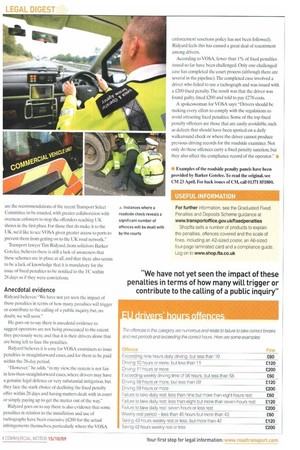Fixed penalties
Page 28

Page 29

Page 30

If you've noticed an error in this article please click here to report it so we can fix it.
New fixed roadside penalties were introduced this spring, giving extra powers to VOSA. What impact have they had on domestic and foreign operators?
Words: Sally Nash / Images: Brian Weatherley, Tom Cunningham VOSA and the police can now make sure that all offending drivers pay their way, thanks to the Graduated Fixed Penalties and Deposits scheme.The regulations were introduced in March, but became effective at the end of May.
In the past, VOSA had to prosecute driving and vehicle offences through the courts. However, this took up a lot of valuable court time, and the fines imposed were not consistent.
Perhaps more importantly, there was no effective way of dealing with non-compliant foreign drivers.
With the new powers in place. fixed penalties are being imposed for more offences than before (in particular, drivers' hours, weight and maintenance offences).
VOSA can impose a penalty (including those for endorseahle offences) for the first time, and, for certain offences, both the police and VOSA are now permitted to impose a penalty of £60,£120 or 1.200, depending on the seriousness of the offence.
Drivers without a satisfactory UK address are now required to pay an on-the-spot roadside deposit against the imposition of a fixed penalty, ranging from £300 to 000. Only the most serious offences, or instances where a single roadside check reveals a significant number of offences, will be met with court action. VOSA examiners are also able to immobilise vehicles where drivers' hours, weight or vehicle safety rules have been broken.
Fixed penalties affect more than just the drivers — those issued by VOSA will feed into the Operator Compliance Risk Score (OCRS). From there, a Traffic Commissioner (TC) can also consider fixed penalties when assessing the fitness or repute of an operator to hold an 0-licence.
Onerous on UK operators
What has been the effect on the industry since the introduction of fixed penalties, and how have hauliers and drivers coped with the new regime?
Road Haulage Association policy director Jack Semple points out that the potential penalties for UK operators are still more onerous than those for foreign operators.
"VOSA has more options for a GB operator," he argues."GB operators can have a site visit, and the TC can hold a public inquiry and take the operator's 0-licence away. But, at the moment, that isn't an option for foreign operators and drivers."
Jo Tanner, Freight Transport Association director of communications, says the scheme had an immediate impact when it was introduced, and sent out a very clear warning that unsafe vehicles and bad driver practice would not be tolerated on our roads.
"The fact that more than 60% of penalty notices issued so far went to non-UK vehicles shows that the regime has made the greatest impact on those it was designed to target the small proportion of negligent foreign drivers and vehicles that put themselves and other road users at risk," says Tanner. For those responsible and compliant UK drivers that comprise the vast majority of our professional workforce, the scheme will not have made a difference."
Tanner goes on to say that the scheme which collected around £500,000 in its first three months of operation is undoubtedly a good start, adding: But what we really need VOSA says drivers do not have to accept a fixed penalty, Instead, they can opt to have the case heard in court. In England and Wales, this means the driver has to write to the VOSA contact centre in Swansea within 28 days. In Scotland, all they have to do is not pay the notice and the case will then be referred to court.
If a driver has a complaint about the fixed penalty (i.e.VOSA has made a mistake in determining the offence, or it has been issued in contravention to published policies), the driver should use the usual complaint route via the VOSA contact centre.
Transport lawyer Tim Ridyard stresses that after being issued with a fixed penalty, an operator should carry out a thorough investigation, retaining a full paper trail on file for at least five years. This should include the driver's account (in writing), tachographs, defect sheets, maintenance records, repair invoices etc where applicable. are the recommendations of the recent Transport Select Committee to be enacted, with greater collaboration with overseas enforcers to stop the offenders reaching UK shores in the first place. For those that do make it to the UK. we'd like to sec VOSA given greater access to ports to prevent them from getting on to the UK road network."
Transport lawyer Tim Ridyard. from solicitors Barker Gotelee, believes there is still a lack of awareness that these schemes are in place at all, and that there also seems to be a lack of knowledge that it is mandatory for the issue of fixed penalties to be notified to the TC within 28 days as if they were convictions.
Anecdotal evidence
Ridyard believes:"We have not yet seen the impact of these penalties in terms of how many penalties will trigger or contribute to the calling of a public inquiry, but, no doubt, we will soon."
He goes on to say there is anecdotal evidence to suggest operators are not being prosecuted to the extent they previously were, and that it is their drivers alone that are being left to face the penalties.
Ridyard believes it is easy for VOSA examiners to issue penalties in straightforward cases, and for them to be paid within the 28-day period.
"However," he adds, -in my view, the system is not fair in less-than-straightforward cases, where drivers may have a genuine legal defence or very substantial mitigation, but they face the stark choice of declining the fixed penalty offer within 28 days and having matters dealt with in court or simply paying up to get the matter out of the way"
Ridyard goes on to say there is also evidence that some penalties in relation to the installation and use of tachographs have been excessive (1200 for the actual infringements themselves, particularly where the VOSA enforcement sanctions policy has not been followed). Ridyard feels this has caused a great deal of resentment among drivers.
According to VOSA, fewer than 1% of fixed penalties issued so far have been challenged. Only one challenged case has completed the court process (although there are several in the pipeline). The completed case involved a driver who failed to use a tachograph and was issued with a £200 fixed penalty. The result was that the driver was found guilty, fined £200 and told to pay £278 costs.
A spokeswoman for VOSA says: "Drivers should be making every effort to comply with the regulations to avoid attracting fixed penalties. Some of the top fixed penalty offences are those that are easily avoidable, such as defects that should have been spotted on a daily walkaround check or where the driver cannot produce previous driving records for the roadside examiner. Not only do these offences carry a fixed penalty sanction, but they also affect the compliance record of the operator." is












































































































































